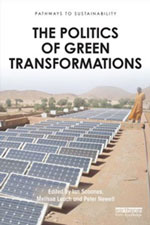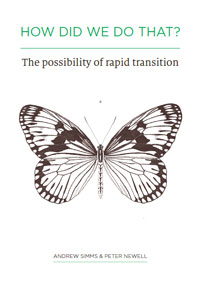Our theme for 2018 is ‘Transformations’.
Faced with a series of social and environmental stresses and shocks, there are urgent calls for radical, systemic change. But, as past and present experience show, this can take many forms. What does it take to make sustainability transformations emancipatory, diverse and caring, rather than repressive or controlling?

This page collects together resources, papers and links on transformations to sustainability to inspire thought and action. We’ll add to this list throughout 2018, and we also welcome suggestions – email [email protected] if you have something to add to this page.
The ‘Transformations’ theme is the first in a four-year programme built around research, learning and events. Find out more about our programme.
Introductory blog series
Overview by Ian Scoones:
Care or control? Four challenges for transformations to sustainability
Introductory blog posts on transformations:
- How do we ‘co-produce’ transformative knowledge?
- Want to transform access to technology? Follow the invisible threads
- Things can change: history and transformations to sustainability
- Green transformations in India and China: who’s in charge?
Papers and books
 The Politics of Green Transformations
The Politics of Green Transformations
This flagship book from STEPS examines who is responsible for green transformations, with chapters by STEPS members and leading thinkers from elsewhere including Mariana Mazzucato, Matthew Lockwood, Stephen Spratt and Hubert Schmitz.
What should ‘transformation’ look like?
Emancipatory transformations: from controlling ‘the transition’ to culturing radical progress
Working paper by Andy Stirling setting out key ideas on the nature of ‘transformations’ to sustainability, questioning the validity of approaches that depend on concentrated power and control.
The politics of transformation
The politics of sustainability and development
Annual Review by Ian Scoones with an overview of the relationships between politics, sustainability, and development, and their practical implications for transformations and alliance building.
Grassroots innovation and democracy
A working paper and briefing about grassroots innovation and its role in making citizens more involved in processes and decisions around innovation.
 Rapid transition: how did we do that?
Rapid transition: how did we do that?
A popular booklet, produced in collaboration with the New Weather Institute, which draws on inspiring examples from history to challenge the idea that rapid change is impossible.
How did we do that? the possibility of rapid transition
Video
Video: from Grand Challenges to Emancipating Transformations
In this November 2017 lecture, Andy Stirling explores how powerful interests shape our ideas about how society should be transformed to confront ‘grand challenges’. Often these prioritise control, certainty and stability. But history points to different examples of radical progressive change that are built on diversity, transformation, mutuality and care.
[embedyt] https://www.youtube.com/watch?v=z0c6Ku3VXOo[/embedyt]Video playlist: Talking transformations
Researchers from the Pathways Network share practical methods and ideas that they are using to study transformations in complex cases around the world where humans and ecologies are entangled.
[embedyt] https://www.youtube.com/embed?listType=playlist&list=PLI8qkz1i11OTDQAJMQXnasJNViOdQvB63[/embedyt]Guides and learning resources
Research and Activism: a guide
A free online guide, part of our STEPS Learning website, created by STEPS Summer School participants to introduce key ideas and useful resources for linking transformative research and activism.
event HIGHLIGHTS
 International conference: ‘Authoritarian Populism and the Rural World’
International conference: ‘Authoritarian Populism and the Rural World’
This conference on 17-18 March 2018 is the first major event organised by the Emancipatory Rural Politics Initiative (ERPI).
The event, hosted by the International Institute of Social Studies (ISS) in The Hague, brings together scholars and activists interested in understanding the rise of ‘authoritarian populism’ in rural settings across the world, as well as the forms of resistance occurring and the alternatives being built.
- Read the first in a series of related articles on openDemocracy:
Confronting authoritarian populism: the rural dimension